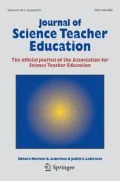Abstract
Teachers enrolled in the master of natural science program for high school science teachers at a large research university must complete a year-long action research study. This account, by the program’s action research coordinator, describes both process and outcomes of this research experience from the perspectives of the research coordinator and the teacher–researchers, shedding light on the organizational learning that takes place, and the ways in which the research experience affected individual teacher–researchers. Teachers reported that their action research experience changed them in fundamental ways, providing them with a framework for deepening their understanding of student thinking, challenging their folk wisdom about teaching and learning, building confidence in their abilities and renewing their commitment to teaching as a vocation.
Similar content being viewed by others
References
Barksdale-Ladd, M. A. (2000). What’s at stake in high stakes testing. Journal of Teacher Education, 51, 384–397.
Cochran-Smith, M., & Lytle, S. L. (1990). Research on teaching and teacher research: Issues that divide. Educational Researcher, 19(2), 2–11.
Cole, K. C. (2003). Mind over matter: Conversations with the cosmos. Orlando, FL: Harcourt.
Crespin, P., Miller, C., & Batteau, A. (2005). Ethnographic research methods. In R. A. Swanson & E. F. Holton (Eds.), Research in organizations: Foundations and methods of inquiry (pp. 281–294). San Francisco: Berrett-Koeler Publishers.
Feldman, A. (1996). Enhancing the practice of physics teachers: Mechanisms for the generation and sharing of knowledge and understanding in collaborative action research. Journal of Research in Science Teaching, 33, 513–540.
Feldman, A. (1999). The role of conversation in collaborative action research. Educational Action Research, 7, 125–144.
Feynman, R. (1965). The character of physical law. New York, NY: Random House.
Fuller, F. F., & Brown, O. H. (1975). Becoming a teacher. In K. Ryan (Ed.), Teacher education, 74th yearbook of the National Society for the Study of Education (Vol. 2, pp. 25–52). Chicago: University of Chicago Press.
Hestenes, D. (1992). Modeling games in the Newtonian world. American Journal of Physics, 60, 732–748.
Hestenes, D. (1997). Modeling methodology for physics teachers. In E. Redish & J. Rigden (Eds.), The changing role of the physics department in modern universities (Vol. II, pp. 935–957). New York: American Institute of Physics.
Hestenes, D. (2009). Modeling instruction for STEM education reform. Tempe, AZ: Arizona State University.
Hestenes, D., Megowan-Romanowicz, C., Osborn-Popp, S., Jackson, J., & Culbertson, R. (in press). A graduate program for high school physics and physical science teachers. American Journal of Physics.
Hewson, P., Tabachnik, R., Zeichner, K., Blomerk, K., Meyer, H., Lemberger, J., et al. (1999). Educating prospective teachers of biology: Introduction and research methods. Science Education, 83, 247–273.
Hutchins, E. (1995). Cognition in the wild (1 ed. Vol. 1). Cambridge, MA: MIT Press.
Kang, N.-H. (2007). Elementary teachers’ teaching for conceptual understanding: Learning from action research. Journal of Science Teacher Education, 18, 469–495.
Lave, J., & Wenger, E. (1990). Situated learning: Legitimate peripheral participation. Cambridge, UK: Cambridge University Press.
Lederman, L., & Teresi, D. (1994). The God particle. New York, NY: Dell.
Megowan, C. (2007). Framing discourse for optimal learning in science and mathematics (Doctoral dissertation). Arizona State University, Tempe, AZ.
Megowan-Romanowicz, C. (2010). The structure of modeling discourse in science and mathematics classrooms. In R. Lesh, P. Galbraith, C. Haines, & A. Hurford (Eds.), Modeling students’ mathematical modeling competencies (pp. 341–352). New York: Springer.
Modeling instruction in high school physics. (2001). Retrieved 4 May 2004, from http://www.ed.gov/offices/OERI/ORAD/KAD/expert_panel/modelinstruction.html.
Pace, L., & Argona, D. (1989). Participatory action research: A view from Xerox. American Behavioral Scientist, 32, 552–565.
Payne Katt, T. (1997). A learning journey (in progress): A personal biographical ethnography. In E. Stringer (Ed.), Community -based ethnography: Breaking traditional boundaries of research (pp. 160–177). Mahwah, NJ: Lawrence Erlbaum.
Rust, F. (2009). Teacher research and the problem of practice. Teachers College Record, 111, 1882–1893.
Smith, M. L. (1991). Put to the test: The effects of external testing on teachers. Educational Researcher, 20, 8–11.
Strauss, A., & Corbin, J. (1994). Basics of qualitative research: Grounded theory procedures and techniques. Newbury Park: Sage.
Stringer, E. (1997). Community-based ethnography: Breaking traditional boundaries of research, teaching, and learning. Mahwah, NJ: Lawrence Erlbaum Associates.
Stringer, E. (2008). Action research in education (2nd ed.). Upper Saddle River, NJ: Pearson.
Taber, K. (2007). Classroom-based research and evidence-based practice. London: Sage Publications.
van Zee, E. (1998). Fostering elementary teachers’ research on their science teaching practices. Journal of Teacher Education, 49, 245–254.
Wenger, E. (1998). Communities of practice: Learning, meaning and identity. Cambridge, UK: Cambridge University Press.
Whyte, W. F., Greenwood, D. J., & Lazes, P. (1989). Participatory action research: Through practice to science in social research. American Behavioral Scientist, 32, 513–551.
Yorks, L. (2005). Action research methods. In R. A. Swanson & E. F. Holton (Eds.), Research in organizations: Foundations and methods of inquiry (pp. 375–398). San Francisco: Berrett-Koehler.
Author information
Authors and Affiliations
Corresponding author
About this article
Cite this article
Megowan-Romanowicz, C. Inside Out: Action Research from the Teacher–Researcher Perspective. J Sci Teacher Educ 21, 993–1011 (2010). https://doi.org/10.1007/s10972-010-9214-z
Published:
Issue Date:
DOI: https://doi.org/10.1007/s10972-010-9214-z




